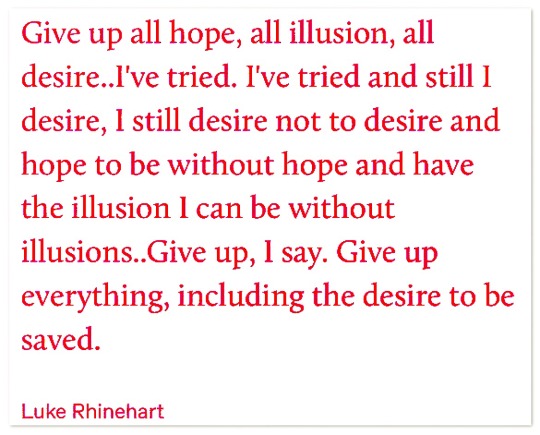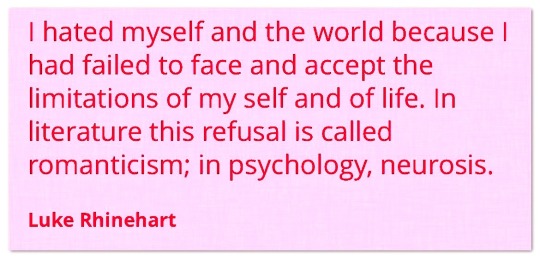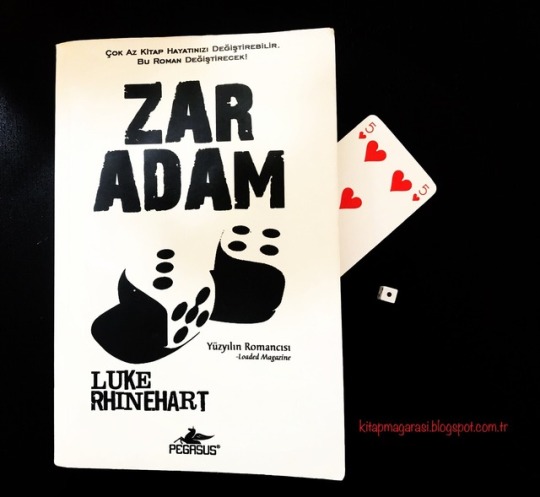#luke rhinehart
Text

#luke rhinehart#dice man#quotes#fighting battles#life struggles#no one saves you#life quotes#this is life
108 notes
·
View notes
Quote
the fear of failure keeps us huddled in the cave of self - a group of patterns we have mastered and have no intention of risking failure by abandoning
The Dice Man. Luke Rhinehart
#Luke Rhinehart#books#quotes#literature#excerpt#fear#failure#life#sad#true#truth#cave#self#pattern#living#intention#risk#abandon#The Dice Man
7 notes
·
View notes
Text
Ivan Campo - Dice Man
2011
Taken from the 2011 album 'What Went Wrong?', Dice Man is a song inspired by the 1970s book 'The Dice Man' by Luke Rhinehart. It tells the story of a man who decides to live his life and make decisions based on the roll of the dice.
Ivan Campo are a British indie-folk band that have been writing, recording, and performing music together for 20 years. In 2023 they released two singles: 'TIME' and 'Golden Hair' whilst they continue to record their next album - a collection of songs based on episodes of Rod Serling's 'The Twilight Zone'.
With their distinct sound of alternative folk, founding members, Adam Shaw, Ben Atha, and Will Rogers were introduced to a wider audience in 2010 when the television series 'Skins' used their song 'The Great Procrastinator' in Episode 1 / Season 4.
The group gathered more attention after Ben Atha was invited to go to Los Angeles in 2016 to play James Bond in the Epic Rap Battles of History YouTube series.
Their last album 'Season of the King' secured the band a 4th live session on BBC 6 Music, as well as a special appearance on prime time Spanish TV programme, Late Motiv, performing their Sherlock Holmes inspired song 'The Bloodhound and the Fox'.
"Dice Man" received a total of 65,7% yes votes!
Follow Ivan Campo here on tumblr! @ivancampomusic
youtube
582 notes
·
View notes
Text
male friend youve known since childhood who just got back from working on literal wall street says yeah i've been getting really into the dice man by luke rhinehart/george cockcroft recently
#karri dni i just think its so funny#literally the same as him getting into american psycho#the dice man#shut up ulrike
2 notes
·
View notes
Photo

«Non hai mai sentito una grande ondata di calore e amore verso una persona o verso l'umanità?» La donna chinò la testa e meditò. «Qualche volta». «A cosa lo attribuisci?» «Alcol». (Luke Rhinehart) https://www.instagram.com/p/CqRLRGXsYtq/?igshid=NGJjMDIxMWI=
11 notes
·
View notes
Text
Five Most Infamous Fictional Psychiatrists
Wall Street Journal
The Dice Man
By George Cockroft, writing as Luke Rhinehart (1971)
In this novel, a character named Luke Rhinehart is a middle-aged Manhattan psychiatrist suffering from depression. Disillusioned with medicine and with life, he finds freedom in the roll of the dice. One roll dictates that he carry out his deeply disturbing fantasy of raping the wife of his close colleague. When he knocks on her door and tells her what he plans to do, he’s taken aback by her compliance. He’s disturbed further when, after two agreeable hours, he realizes that he has changed in some indefinable but significant way. He extends the laws of chance to his clinical decision-making, which alleviates his deep-seated fear of failure and allows him to begin viewing his work as something of a game. He advises a female patient diagnosed with nymphomania to find work in a busy Brooklyn brothel. To a slender young woman from Greenwich Village who likes talking about herself he says, "In summation, that as human beings go you are mediocre in all respects except in the quantity of your fortune."
The Silence of the Lambs
By Thomas Harris (1988)
Hannibal Lecter is a serial killer who—before his conviction for nine homicides and subsequent commitment to the Baltimore State Hospital for the Criminally Insane—was a highly respected forensic psychiatrist. He has an unerring capacity to strip people of their mental defenses and an intelligence that defies metrics. A cultured man, he’s endowed with a glacial calm and an iron will. We’re told that Lecter’s thoughts are no more bound by fear or kindness than “Paradise Lost” author John Milton’s were by physics. Hannibal abhors bad manners and enjoys eating the flesh of the intolerably rude. He delights in describing to Clarice Starling—the FBI trainee sent to seek his assistance in solving a case of serial murders—how he savored a census taker’s liver, which he cooked with fava beans and washed down with a glass of Amarone wine.
Super-Cannes
By J.G. Ballard (2000)
Lured by tax concessions, a Mediterranean climate and a Euro-corporate lifestyle, dozens of multinational companies have moved their business into Eden-Olympia, a business park populated by a highly paid elite of senior managers, administrators and entrepreneurs. The flawed and dangerous antihero of this dystopia of technology is the staff psychiatrist Wilder Penrose, an “amiable Prospero” with evasive eyes and an eager smile, who steers his clients’ darkest dreams toward the daylight. Wilder’s vision is to create an intelligent modern city that promotes advanced health screening, up-to-the-minute gadgetry and the replacement of the civic with the commercial. But as the novel proceeds, it becomes clear that Wilder is more concerned with exciting the base instincts of those in charge. He explains to the book’s protagonist, Paul, that ever since he organized the drug and vice rings and a leather-jacketed “bowling club” whose sorties into the outside world leave Arab pimps and Senegalese trinket merchants bleeding in the gutters, the park’s chief executives no longer complain of stress and burnout and profits have soared.
The Alienist
By Machado de Assis (1882)
A young doctor decides to settle down and set up a medical practice near Rio de Janeiro. The corrupt local council, dazzled by Dr. Bacamarte’s impeccable credentials, welcomes him and gives him carte blanche to study mental illness free from oversight. As Bacamarte diagnoses more and more people as being mad, the town’s barber leads a revolt against him. Justifying his actions, Bacamarte explains: “Till now, madness has been thought a small island in an ocean of sanity. I am beginning to suspect that it is not an island at all but a continent.” After he has locked up more than 80% of the town’s population—including his own wife—Bacamarte suddenly suspects that it is the remaining, seemingly well-balanced minority who are crazy. Rectitude, patience, loyalty and modesty, he now believes, are the true signs of mental illness. And as the most rational individual in the region, he is now compelled to diagnose himself as mad, spending the final 17 months of his life in solitary confinement. The author of “The Alienist” was an epileptic with considerable experience of real doctors. This 80-page novella is steeped in humor, in addition to being a tale of professional power run amok.
Asylum
By Patrick McGrath (1997)
Peter Cleave, the medical superintendent of an English asylum for the criminally insane, is the narrator of this story. Set in 1959, the tale revolves around the fatal erotic obsession of Stella Raphael, the cultured and restless wife of one of Peter’s colleagues. The object of her passion is the talented sculptor Edgar Stark, who was committed to the asylum for murdering and disfiguring his wife. That doesn’t prevent a relationship with Stella from blossoming once Edgar escapes from the asylum. Stella meets up with him in London and establishes a bohemian life. The scandal forces Stella’s husband, Max, to leave his position as a forensic psychiatrist and work elsewhere, but that doesn’t put an end to the affair. Peter is a rather dry narrator, but there are hints of his deficiencies as a psychiatrist. Infatuated with her, ignoring his duty as her psychiatrist, he pursues her obsessively, to a not altogether surprising ending
3 notes
·
View notes
Text
“Anxiety is a difficult emotion to describe. The leaves outside the window no longer seemed vibrant; they seemed glossy as if being revealed in an overexposed technicolor film.”
~ Luke Rhinehart (George Cockcroft) “The Dice Man” (1971)
1 note
·
View note
Text
youtube
Talk Talk's "single SUCH A SHAME.
Inspired by the Luke Rhinehart novel ‘The Diceman’, the haunting melancholic SUCH A SHAME is a tale of frustration in choosing a single path to follow over the tantalizing prospect of a life enriched by giving rein to one’s alter egos. The book contains elements of experimental sex, rape, murder, and governance and commerce.
Mark Hollis, who was a psychology student before his music career, confirmed this in an interview in 1984: “The song was inspired by the book 'The Diceman' by Luke Rhinehart, dealing with someone who lets the dice decide what he’ll do."
“He obeys and submits his personality completely. When we got to the video recording we did the same. Because the song was written in the same style as the book, the music was the soundtrack of a small three-minute film.”
The video for the song was recorded under that premise. Directed by Tim Pope, was also influenced by the book, it features Mark Hollis portraying six randomly chosen personalities."
via: Decade 77-87 - a grown up disco: new wave, punk, postpunk, goth & indie
0 notes
Text
Boksignering av Den trettonde punkarn den 10 december - Akademibokhandeln Sickla Köpkvarter

Arne Wickanders signerar den nya hyllade fristående romanen Den trettonde punkarn. Detta på Akademibokandeln - Sickla Köpkvarter, Simbagatan 10, i Nacka den 10 december 12.00-14:00. Boken avslutar den prisbelönta romansviten om punkarna från Bollmora.

Romanen utspelar sig under 1990-talet. Förortscentrumen glasas in. Det blir alltmer påtagligt vilka som får vara därinne och vilka som inte är välkomna.
Nina Lekander skriver i Expressen den 3 december.
Arne Wickander ”Den trettonde punkarn”
Man vänjer sig vid bristen på versaler och skrattar ofta högt när Bollmoraskildraren nu har flyttat från förortens 70-tal till 80-talet i Stockholms innerstad. Arne dricker wellpappvinet Beyaz och förnyar slangen. Här kommer trashproletariatet, vik hädan brackor och förmyndare! Fulkultur när den är som finast.
Anders Kapp skriver på Kapprakt den 15 november.
"Den avslutande delen är något mörkare än de andra delarna och det handlar inte bara om att punkens främsta storhetstid börjar dö ut under nittiotalet. Punkarna själva åldras, författaren och många av hans vänner har passerat trettio, en del byter livsstil, ”dom kammade ner håret och började på komvux”, för en del blir konsekvenserna av många års hårt liv omöjliga att bära; några av vännerna dör i den här berättelsen.
Men fortfarande finns det underbara skrönor. Det är en het sommardag. Arne har flera gånger sett ”marekandre” (Mare Kandre) på stan och är på jakt efter hennes böcker. Han hamnar på ett antikvariat, går vilse bland gångarna på övervåningen men kommer så småningom fram till en glänta där turbo sitter nedsjunken i en campingstol och läser The History of the Decline and Fall of the Roman Empire. Bredvid honom finns en tältsäng så han verkar ha varit där ett tag. Där finns också stora lollo som tar fram ett campingkök och fixar en middag med ungerska specialiteter. Så småningom dyker nilz pilsner också upp. När Arne väl kommer ut har det blivit höst. Hela scenen och samtalen i antikvariatsgläntan är en underbar absurdism på nivå med Beckett.
Vännen turbo har här liksom rätt många under den tiden fastnat för Luke Rhineharts kultbok Tärningsspelaren och låter tärningen bestämma sitt liv. En dag är han en av de sista i gänget som svajar ut från krogen sedan tärningen sagt åt honom att han måste läsa Oswald Spenglers Der Untergang des Abendlandes från 1918 på originalspråk. Arne ser honom gå: ”tänkarn. fyllosofen. mystikern. anakronistisk som en telegrafskylt i en medeltida hansastad.” En av väldigt många fantasirika metaforer som skapar läslycka.
Normalt är jag rätt allergisk mot ett överdrivet ljudhärmande skriftspråk (skriva ”sej” i stället för ”sig” och liknande) vilket jag skrivit mycket om tidigare som inte ska upprepas. Men Arne Wickander är undantaget som bekräftar regeln. Redan i första delen skapade han ett underbart punkspråk som håller genom hela trilogin. Här används bara versaler när någon skriker, få andra skiljetecken än punkter, och mängder av ord som aldrig kommer att uppträda i SAOL men som skapar den perfekta miljön för just dessa berättelser. Det finns en detalj som gläder mig särskilt mycket. Jag är road av språkets successiva förändring, tycker det är kul att följa trender, men kan ibland drabbas av nostalgisk sorgsenhet över sådant som försvinner, ungefär på samma sätt som man kan känna sympati för utrotningshotade djur. Ett sådant exempel är pluraländelsen ”er” som successivt äts upp av jätten ”or”, kollegerna som blivit kollegor är bara ett av många av exempel, men i denna text har många nästan alltid ”er” som avslutning vilket gör mig lycklig.
En annan aktuell trend är när ”att” allt oftare utesluts från meningar där ordet tidigare varit självklart men i denna text ersätts det ofta av ”och”, i stället för att bara uteslutas, vilket ger en spännande språklig effekt."

Första boken i trilogin, Den tredje punkarn, gavs ut på annat förlag. Den fick Selmapriset 2019. Sammantaget spänner romansviten över 1970-, 80- och 90-talen.
Read the full article
0 notes
Text
Egy kósza gondolat fūggőknek......... mi a fasz történne, ha egy napot kihagyunk a tumbliból ( meg az összes csetből, bazmeg!)... séta, köldöknézés, maszturbálás, kocsmázás, csajozás, faszizás? Ránézek az asszonyra, gyerekre... Egy napig. Egy napra? Az unalomból szūletnek a hasznos gondolatok.
Holnap visszatérjūnk? Megbeszéljūk? Próba? Kiteszūnk egy "1 napig nem cseteltem, tumbliztam" matricát?
Ajánlott olvasmány:

3 notes
·
View notes
Text

#luke rhinehart#life struggles#fighting battles#infp quotes#life quotes#infp thoughts#romanticism#neurotic
41 notes
·
View notes
Quote
But we drag our old selves with us and they impose their solid oak frames on all our experience
The Dice Man. Luke Rhinehart
#Luke Rhinehart#books#quotes#classic#The Dice Man#life#nostalgia#past#old#selves#sad#feelings#true#truth#tragic#tragedy#melancholy#oak#fram#experience#perception#future#suffering#painting#limitations
11 notes
·
View notes
Quote
Understand yourself, accept yourself, but not be yourself
“The Dice Man” (1971) by Luke Rhinehart
4 notes
·
View notes
Text

ZAR ADAM ~ LUKE RHINEHART
@pegasusyayinlari
#kitapmagarasi#zar adam#luke rhinehart#george cockcroft#the dice man#kitap öneri#bookblr#Kitap Yorum#kitap blog#kitap blogger#book#kitap okumak#kitap#kitapkurdu#kitapunya#bookstagram#bookstagramturkey#bookworm#book obsessed#bookaholic
1 note
·
View note
Text
🖤🎲📚

#booklover#bookstagram#bookworm#books#the dice man#luke rhinehart#resting#reading#my update#my photography#pegasus#zar adam#my bottle
1 note
·
View note
Text
The Dice Man
av Luke Rhinehart (George Powers Cockcroft)
Jag vet inte hur jag ska inleda den här recensionen. Men jag bjuder på några utkast till första stycket:
"Den här boken kommer att förändra ditt liv"... Kreativa alster där det blir alldeles för uppenbart att avsändaren försöker framkalla antingen den ena eller den andra reaktionen hos mottagaren kan i bästa fall ses som en slags propagand, men i värsta fall
Det finns en litterär strömning som jag saknar namn på, men där den tilltänkta målgruppen är uttråkade personer i amerikanska villakvarter, eller uttråkade personer i allmänhet som bara ser sin egen brist på frihet och därför greppar efter olika perspektiv och verktyg för att återerövra vardagen -
En uttråkad psykolog eller psykiater förlorar pengar på poker och inser hur mäktig slumpen är. Läs ordet "mäktig" som om det vore en tonåring som uttryckte det. Alltså lika delar "med makt" som "med cool". Sensmoralen i boken känns ungefär lika pubertal som när en bekant från mitt ungdomsgäng kom tillbaka efter ett tiodagars meditationsläger och sa att han insett att det är okej att döda, då människor dödar djur utan att blinka och djur är själsligt likställda människan.
Berättelsens fortsätter med att han bestämmer sig för att låta slumpen styra hans liv. Han tar fram en sexsidig tärning. På ett papper skriver han ner en handling för varje sida på tärningen. Typ:
Fortsätt dagen som vanligt
Säg upp dig från jobbet
Återuppta kontkten med en gammal vän
Rensa vattenlåset under handfatet
Våldta grannen
Vi stannar där. Det visar sig nästan direkt att huvudpersonen i berättelsen är en djupt störd människa, och tärningsspelandet blir ett kicksökande där konsekvenserna får ringa betydelse. Det viktiga blir att bevisa för sig själv att han tar slumpen på allvar - och som tur är så ville grannen faktiskt ha sex med honom. Egentligen. Och våldtäktsscenen är inte nån slags mörk kulmen i berättelsen, utan det första utfallet i tärningsexperimentet. Slumpen och riskerna gör att han känner att han lever igen, vilket gör att han så småningom ger upp sitt övriga liv. Han fortsätter svina runt, anordnar tärningsfester, han uppviglar psykpatienter och ganska snart byggs en rörelse av följare upp runt honom. En del av hans kollegor gör invändningar, men han fortsätter trycka på hur fri han blivit. Snart har han blivit av med jobbet: "Vad bra, då kan jag förstöra för mig själv och andra på heltid!". Men att detta skolboksexempel på utåtagerande självdestruktivt beteende aldrig adresseras av varken berättaren eller omgivningen förtar trovärdigheten i hela upplevelsen. Och den enda frågan boken egentligen ställer är: "är frihet friheten att välja eller friheten från ansvar och konsekvenser?".
Jag avråder alla mina läsare som slutat högstadiet från att läsa den här boken.
0 notes